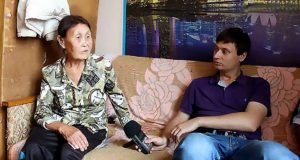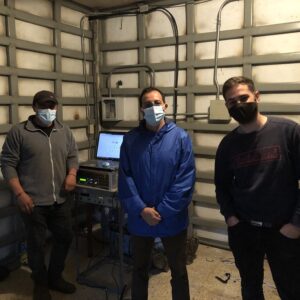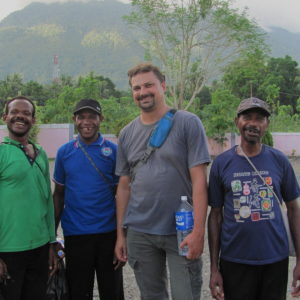Spring comes late to Nanai country in the Russian Far East. Ice on the nearby Amur River can be three feet thick after a winter where temperatures plummet to 40 degrees below zero. Yet life thrives here. Ice fishermen find success even on the coldest days.

Timur’s teammate, Misha, makes a Nanai language recording.
In the bustling village of Troitskoye, parents don’t push strollers. They pull sleds. And inside the Full Gospel Church about 25 believers gather to worship. The congregation reflects the area’s mix of people – the ancient Nanai culture and the modern Russian culture.
The main road runs parallel to the Amur River through a vast birch forest. Villages are about 12 miles apart, spaced originally as winter resting points for horses and riders.
Fishing frames life for most in this region. In September, when the red salmon run, everyone is at the river. A few weeks work provides families with enough fish for the long winter and beyond. For those who fish commercially, it provides an income stream.
Commissioned by Wycliffe Russia, three men – Anton, Timur and Misha – were part of a survey team sent to learn more about the Nanai people of Siberia and their language. They sought to make key contacts and look for believers among the people. They also desired to get to know their language and culture, and see firsthand the local realities of the Nanai people’s lives.
Because these visitors were interested in her language, she was now interested in their God.
When they arrived at a certain Nanai village they were welcomed by a leader there who was a Christian. The leader’s mother, however, was not a Christian and she did not approve.
Earlier in their travels Anton and his friends had been delayed because of the weather, and so they had used webonary.org, produced by Wycliffe’s main partner organisation, to create a Nanai Audio Dictionary, using data they had recorded in a previous village. They sat down with some folk from the current village and demonstrated the dictionary to them. A small crowd gathered, including the disapproving mother. She was not a believer, but she was passionate about her Nanai language. She was surprised to find that Anton and his friends were also passionate about her Nanai language. Therefore, she accepted them and was willing to be their friend.
They sat with the people for hours and hours, discussing the language and the ideas they had for training local Nanai people to craft and memorise stories, Bible stories, in the Nanai language. The subject of the conversation eventually moved on to God. The leader’s mother listened intently, no longer disapproving. Because these visitors were interested in her language, she was now interested in their God.










